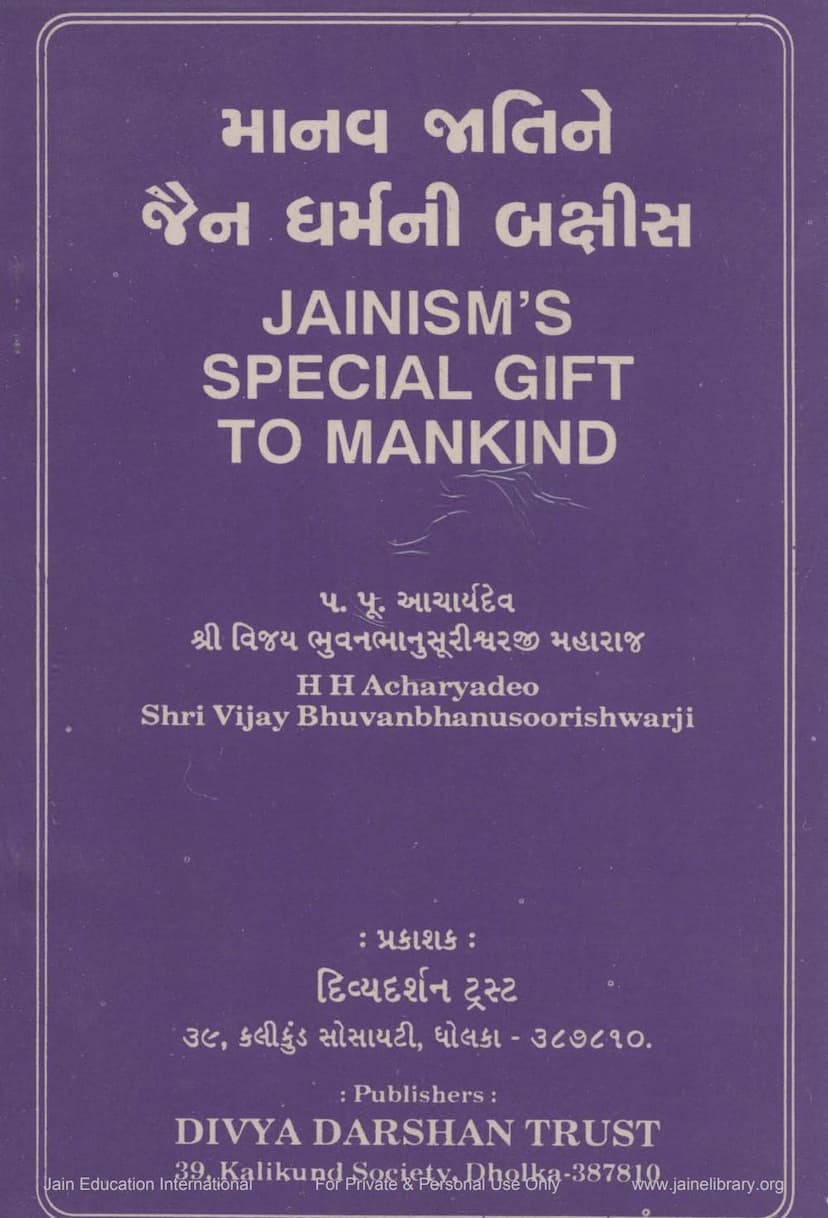Manav Jatine Jain Dharmni Bakshish
Added to library: September 2, 2025

Summary
Here is a comprehensive summary of the Jain text "Manav Jatine Jain Dharmni Bakshish" (Jainism's Special Gift to Mankind) by Acharya Shri Vijay Bhuvanbhanusuri:
Introduction and Context:
The book is based on a lecture delivered by HH Acharyadeo Shri Vijay Bhuvanbhanusoorishwarji on February 15, 1970, at the Banaras Sanskrit University. The lecture, given at the request of the university's Vice-Chancellor, focused on the unique contributions of Jainism to humankind. The audience included prominent scholars and Buddhist monks, highlighting the intellectual and spiritual significance of the topic. The Research Director of the university, Pandit Badri Nathji Shukla, introduced the Acharya, emphasizing his deep study of various philosophical systems, including Western philosophies, and his ability to synthesize them with a scientific perspective.
Core Message: The True Goal of Humanity and the Limitations of Materialistic Education:
The central theme is that while humanity has made significant advancements in the physical and chemical realms, it remains largely ignorant of the ultimate goal of life. Modern education, focused solely on material progress, lacks a clear understanding of "why" these advancements are being made and what ultimate purpose they serve. The lecture contrasts this with the spiritual teachings of sages and seers, which are designed to achieve true happiness for individuals and liberate them from the cycle of birth and death.
The Importance of a Healthy Mind:
The text argues that true happiness does not stem from wealth or sensory pleasures but from a healthy mind. Quoting American psychologists, it states, "Man is not a belly, but a Brain." A healthy mind is crucial for happiness in this life and the hereafter. This concept resonates with Western thinkers as well, as evidenced by an American writer's book, "Return to Religion."
The American Psychiatrist's Revelation:
The book recounts the experience of an American psychiatrist who, after treating thousands of patients with mental ailments, realized that the advice he was giving – emphasizing qualities like empathy, appreciation, service, and kindness – was already present in ancient religious scriptures like the Bible. This realization humbled him and led him back to religion, highlighting the timeless wisdom found in spiritual texts.
The Nature of True Happiness and Spiritual Living:
The text elaborates on how religious individuals find contentment. They reconcile their minds by considering the other person's perspective, recognizing the other's right to self-respect, appreciating the services of others, and accepting that one receives treatment according to their destiny or past karma. This internal reconciliation prevents them from external complaining.
Critique of Western Religions and the Uniqueness of Indian Religions:
The lecture critically examines Western religions for their focus solely on the present life and their omission of concepts like the eternal soul, the afterlife, karma, and liberation. It suggests that this omission may stem from a desire to avoid direct competition with the spiritual depth of Indian philosophies. This lack of focus on the eternal soul and the afterlife, according to the text, limits the scope of human achievement to a lower level, neglecting the potential for spiritual growth.
The Gifts of Indian Religions:
Indian religions, particularly Jainism, are presented as offering profound gifts to mankind:
- Belief in Transmigration and the Eternal Soul: Indian religions, termed "Aryan religions," acknowledge the eternal soul, the afterlife, karma, and liberation, opening vast possibilities for human development.
- Emphasis on Renunciation and Detachment: They teach detachment from sensory objects, recognizing them as sources of suffering and the root cause of negative emotions like anger, greed, and pride. This leads to a life of contentment and virtue.
- Subtle Non-Violence (Ahimsa): Jainism's unique contribution is its emphasis on Ahimsa extended to even the subtlest forms of life, including single-sensed beings like earth, water, and plants. This concept is presented as crucial for cultivating compassion and preventing the development of cruelty that can escalate to harming fellow humans.
- A Scientific Approach to Life: Jainism's detailed understanding of life forms (biology), its Karma philosophy, and its stages of spiritual progress (Gunathanas) are presented as scientific and logical frameworks for spiritual evolution.
- The Path to Liberation (Samvara and Nirjara): Jainism provides a clear, step-by-step path (Samvara and Nirjara) for the soul to shed karmic bondage and achieve liberation (Moksha) and attain the state of a Supreme Soul (Parmatma).
- Syadvada and Anekantavada: The principles of Syadvada (conditional predication) and Anekantavada (non-absolutism) offer a relativistic perspective, allowing for the synthesis of seemingly contradictory viewpoints. This promotes harmony and conflict resolution by encouraging an understanding of multiple perspectives.
- The Twelve Vows for Householders: Jainism outlines a structured path for householders through twelve vows (Anuvaratas, Gunavratas, Shikshavratas) that guide them towards a virtuous and spiritually progressing life, ultimately leading to the possibility of renouncing the world and becoming monks.
The Influence of Jainism:
The text highlights the impact of Jainism's teachings on prominent Western thinkers like Bernard Shaw, who expressed a desire to be born as a Jain in his next life due to Jainism's emphasis on the potential for any soul to become a Supreme Soul and its scientific approach to spiritual evolution. Shaw's compassion for even single-sensed beings is presented as an example of Jainism's profound ethical influence.
Conclusion:
The book concludes by emphasizing that Jainism's unique contributions—its understanding of life, its principles of relativity, its karma science, its path of renunciation, and its stages of spiritual progress—are invaluable gifts to mankind. By embracing these teachings, humanity can achieve true happiness, spiritual elevation, and ultimately, liberation. The text expresses a wish that humanity utilizes these gifts for its ultimate welfare.